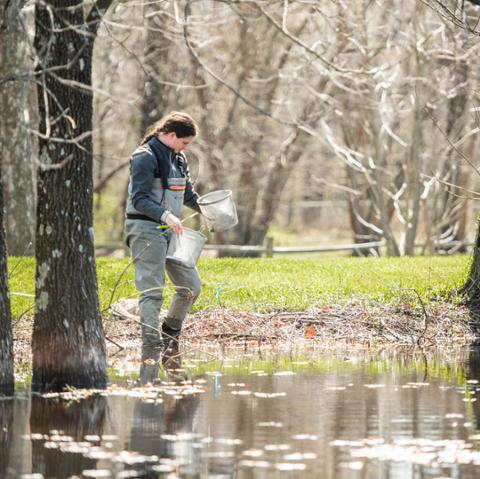Wildlife Ecology and Conservation
Major in Biology with an Emphasis in Wildlife Ecology and ConservationPreserving ecosystems from field to forest.
The Wildlife Ecology and Conservation emphasis track combines a love of the natural world with the desire to protect it.
Our curriculum focuses on the biology, protection, and management of wildlife and their natural habitats. Gain a deep understanding of the intricate connections between species and their environment.

Study species in their natural habitats. Learn about pressing conservation challenges, sustainable resource management, and the importance of community engagement.


Classroom Topics in the Wildlife Ecology and Conservation Emphasis
-
Wildlife Ecology and Management: Apply ecological principles to manage and conserve wildlife populations.
-
Natural Selection: Analyze evolutionary processes and adaptative strategies in the context of wildlife species.
-
Principles of Conservation: Implement strategies and evaluate approaches for the sustainable conservation of biodiversity.
-
Invasive Species Management: Develop and execute plans to control and mitigate the impact of invasive species on ecosystems.
-
Herpetology, Ornithology, and Mammalogy: Engage in hands-on studies, focusing on the identification, behavior, and conservation of reptiles, birds, and mammals through field research and observation.
Combining both lab and field activities, this program gives students a hands-on, interactive look at the relationships between organisms.
What is a Wildlife Biologist?
Wildlife biologists play a vital role in maintaining the balance of ecosystems. Their duties may include:
- Conducting field research
- Monitoring wildlife populations
- Managing wildlife habitat
- Developing and implementing conservation plans
- Educating the public about wildlife and conservation issues
- Policy making for sustainable resource management
The median wildlife biology salary is $64,650 according to the Bureau of Labor Statistics.
Careers Ecology Wildlife and Conservation Emphasis Graduates Enjoy:
-
Wildlife Biologist: Study and manage the behavior, habitats, and populations of wild animals.
-
Fishery Biologist: Focus on the conservation and management of aquatic ecosystems and fish populations.
-
Zookeeper: Oversee the care, breeding, and well-being of captive wild animals in zoological settings.
-
Veterinarian: Provide medical care and treatment to ensure the health and welfare of animals.
-
Natural Resources Manager: Plan and implement strategies for sustainable use and conservation of natural resources.
-
Environmental Consultant: Advise on and address environmental issues, ensuring compliance with regulations and promoting sustainable practices.
This track is recommended for students pursuing a career in zoology, evolutionary biology, environmental science, wildlife biology, conservation, and more.
Additional information
Biology - Wildlife Ecology & Conservation Degree Map download
Catalog – see catalog for the School of Science and Mathematics